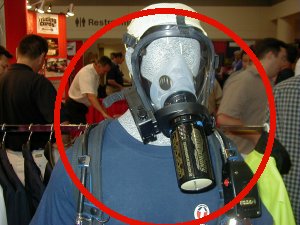- What the hell are we thinking?
- This is really the first time I have ever been put in this position since the website has been established, but here
goes.
- I just read an advertisement in a national trade journal, (actually several trade jounals) about a new product called
Smoke Eater.
-
- I want to be very clear right here in the front end of this commentary that I am not making any comment about
the manufacturer of the product, the quality of the assembled product, or anything like that.
-
- My issue is simple....it revolves around the basic concept, and the advertising and marketing techniques.
-
- I also am having some problems with the specified limitations of the product, as they are pretty narrow in their
application to the fire service.
-
- If you have not seen this advertisement I suggest you review your trade journals and review this for yourself.
-
- Here is a picture of the product that I took during a recent visit at the Baltimore Firehouse show.
-
- The premise is a cartridge type filter system that according to advertising literature "traps smoke particles, has a
carbon bed to capture hazardous gases, and a Monolith ceramic catalytic converter that is coated with platinum
and palladium to convert carbon monoxide into carbon dioxide."
-
- The advertisement also states at the very start.." A fire doesn't stop when your air gauge reads empty which is
why you need the Smoke Eater...."
-
- It states that it gives you approximately 15 minutes of breathing protection if you run out of air.
-
- While at the show I asked for a specification sheet on the Smoke Eater itself. Some interesting facts were on the
sheet and I would encourage many of you to read it further.
-
- The ratings for the device were somewhere in the range of 77 degrees and 87% humidity. I don't know but I have
been in one or two fire rooms that were just a tad different from that!
-
- It also states that the filter is good for carbon monoxide to about 3000 ppm with a breakthrough of 500 ppm after
15 minutes.
- Carbon monoxide in a small room fire in minimal conditions are roughly 5000 on a good day and in basement fires
with limited combustion can be over 100,000 ppm easily.
-
- Also, some number of years ago....(1975 to be exact ) when I first became an EMT there was an entire lecture on
how carbon dioxide could affecct my respiratory rate. My vague recollection was that it increased respiratory
rate. Why in the hell would I want to convert CO into CO 2 and increase the rate at which I took in toxins?
-
- Didn't we already try cartridge type masks before in the fire service?
-
- Here are the points of my commentary:
-
- * The company that makes the product is a fine and reputable company.
-
- * The product itself may be manufactured to very high standards.
-
- * We need to tell our firefighters to check their breathing air gauges consistently and not to wait for a low air
alarm. Firefighters have to be exiting the building as a team when their low air alarm begins to sound or before!
We are training them to listen for the low air alarm, then they assume there will be no obstacles or difficulty in
escaping so we are killing firefighters by them overextending their air supplies.
-
- * In addition to making each member check and monitor their own breathing air consumption on a regular interval
basis during use, maybe it is time we do something like the british fire services and assign a BA (Breathing
apparatus) officer to monitor time, pressure and air consumption so our members do not overextend their air
supplies.
-
- * It is my belief an opinion only that looking at the spec sheets the conditions at which this device will operate do
not even represent a structural fire condition 20 minutes into a fire attack. (Presumably when we will run out of air
and need this device)
-
- * I believe that an uninformed firefighter could beleive that this is a false sense of security, and would use it in
marginal or extreme conditions beyond it's design limitations.
-
- * The probelm of overextending our air supplies is behavioral, should be modified by training, and not technology.
-
- Train your personnel to monitor their air supplies, and you should be checking on your folks every fifteen minutes
anyway, so lets go another way with this concept....lets get our people where they don't need this device. If we are
going to supplement them with an escape pack then it should resemble our existing packs except in size and
duration. It should be closed device that provides breathing air in and open circuit device that exhales into the
atmosphere.
-
- Click the button below and post your thoughts and ideas on the bulletin board I will recopy this post above to start
us off.
-

